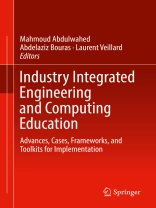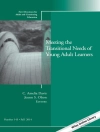This book introduces recent global advances and innovations in industry integrated engineering and computing education to academics, program managers, department heads, and deans, and shares with readers a critical perspective on future potentials in industry integrated engineering education. It covers topics and issues such as integrated engineering and computing education, part-time engineering masters programs, secure BIM learning, ethics, and IT workforce development. The book concludes with detail information on summarizing and extracting different frameworks, cases, and models into a practitioner toolkit, along with pragmatic recommendations for engineering education academics to quickly utilize, adopt, and adapt the toolkits for their own curricular development activities.
Table des matières
Editorial Perspectives on Industry Integrated Engineering and Computing Education.- Models, Frameworks, and Tools for Translational Utilization in Constructing Industry and Social Needs in Engineering and Computing Education.- Lesson Study among engineering lecturers as a way to plan, implement, and improve new innovations in teaching and learning.- Part-time engineering masters programs: implementing real-life engineering problems as a mean of learning.- Secure BIM learning based on new information technology patterns.- Exploring the rotational onboarding programs for early-career engineers in practice.- Reverse engineering and straightforward design as tools to improve the teaching of mechanical engineering.- Teaching safety, health, and environment in engineering programs for millennials – Ethics is the basis.- Factors affecting the success of IT workforce development, a perspective from Thailand’s IT supervisors and internship students.- A collaborative and interdisciplinary approach to bring closer a curriculum to local employer needs.- Towards a holistic approach of cybersecurity capacity building through an innovative transversal sandwich training.- Industry Integrated Education Toolkits for Academicians, Deduction from the Literature and the Book Global Cases.- Editorial Conclusions.
A propos de l’auteur
Dr. Mahmoud Abdulwahed is Founding Head of Technology Innovation & Engineering Education (TIEE) at Qatar University.
Prof. Dr. Abdelaziz Bouras is a Professor in the Computer Science and Engineering Department – College of Engineering at Qatar University, where he is chairing the industrial and external relations committee and managing the Pre-Award Department at the Office of Research Support.
Dr. Laurent Veillard is an Associate Professor and member of the ICAR laboratory at Lyon 2 Lumière University, France.












